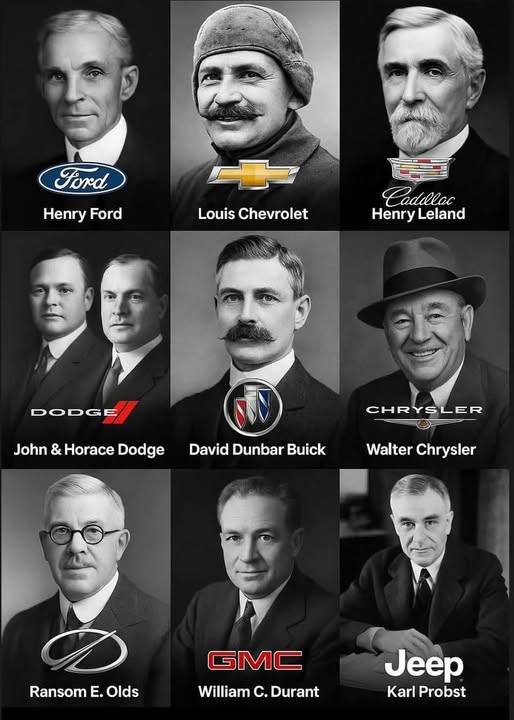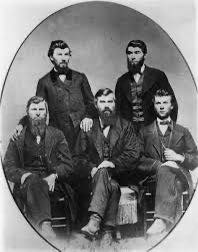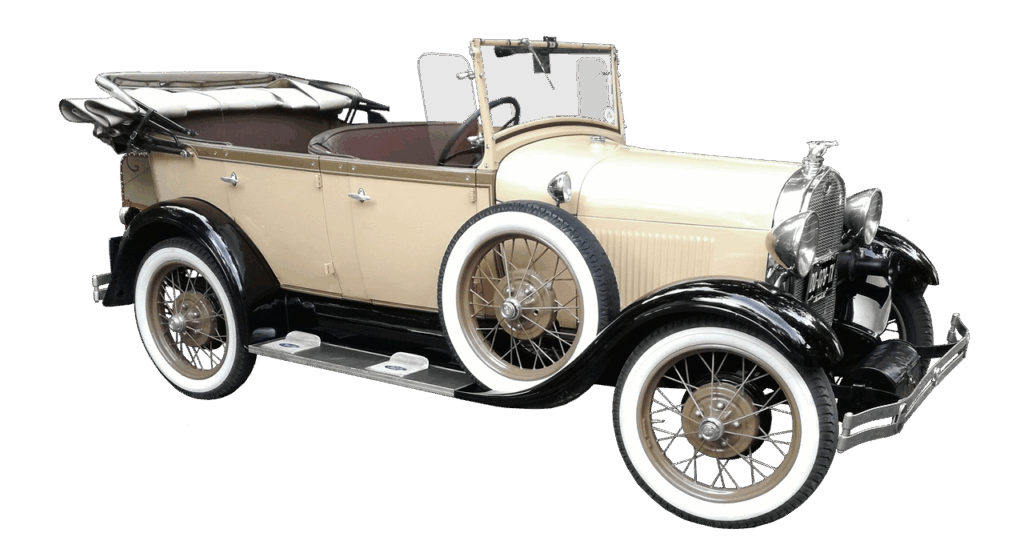The history of the automotive industry is a story of innovation, entrepreneurship, and technological advancement, driven by visionary founders who transformed personal mobility and industry standards. This article delves into the lives and contributions of prominent automobile founders, including Henry Ford, Louis Chevrolet, Henry Leland, John & Horace Dodge, David Dunbar Buick, Walter Chrysler, Ransom E. Olds, William C. Durant, Karl Probst, the Studebaker brothers, and additional key figures shaping automotive history.

Car Company Founders
1. Henry Ford (Ford Motor Company)
Early Life and Background:
Henry Ford was born on July 30, 1863, in Dearborn, Michigan. He displayed mechanical aptitude from an early age, working as an apprentice machinist and gaining hands-on experience with engines and machinery.
Founding of Ford Motor Company:
In 1903, Ford established the Ford Motor Company, which would revolutionize manufacturing and transportation. His primary innovation was the implementation of the moving assembly line, introduced in 1913, drastically reducing production costs and time.
Contributions:
- Pioneered mass production techniques.
- Introduced the Model T in 1908, making automobiles affordable for the American middle class.
- Advocated for higher wages with the $5 workday to reduce turnover and promote a stable workforce.
Legacy:
Henry Ford’s innovations in manufacturing and marketing transformed the automobile from luxury item into an accessible commodity, profoundly influencing industrial practices worldwide.
2. Louis Chevrolet (Chevrolet Motor Car Company)
Early Life and Background:
Born on December 25, 1878, in La Chaux-de-Fonds, Switzerland, Louis Chevrolet emigrated to the United States in 1900. He was a talented race car driver and mechanic.
Founding of Chevrolet:
In 1911, Chevrolet co-founded the Chevrolet Motor Car Company with William C. Durant, who also founded General Motors. Chevrolet was instrumental in designing the early Chevrolet cars, emphasizing performance and affordability.
Contributions:
- Brought racing experience and engineering expertise.
- Helped develop the Chevrolet brand, which became GM’s most popular division.
- Focused on producing reliable, affordable vehicles for the mass market.
Legacy:
Louis Chevrolet’s name remains associated with one of the world’s most iconic automobile brands, symbolizing performance and value.
3. Henry Leland (Lincoln, Cadillac)
Early Life and Background:
Born in 1843 in Vermont, Henry Leland was a skilled machinist and inventor with a background in precision manufacturing.
Founding of Cadillac and Lincoln:
Leland founded the Cadillac Automobile Company in 1902, which became a subsidiary of General Motors. Later, he founded the Lincoln Motor Company in 1917, producing luxury vehicles.
Contributions:
- Known for high standards of engineering and precision manufacturing.
- Helped establish the “luxury car” segment in America.
- His emphasis on quality helped Cadillac and Lincoln build prestige.
Legacy:
Leland’s focus on quality and precision set standards for luxury automotive manufacturing.
4. John & Horace Dodge (Dodge Brothers)
Early Life and Background:
Brothers John and Horace Dodge were born in the 1860s in Michigan. They were skilled metalworkers and entrepreneurs.
Founding of Dodge Brothers:
In 1900, they founded the Dodge Brothers Company, initially producing bicycle parts before transitioning into automobile parts and then complete vehicles.
Contributions:
- Supplying parts to early automakers like Ford.
- In 1914, they launched their own vehicle line, emphasizing durability and performance.
- Their vehicles gained a reputation for ruggedness and reliability.
Legacy:
Dodge remains a significant brand in the automotive world, known for performance vehicles and muscle cars.

.
5. David Dunbar Buick (Buick Motor Company)
Early Life and Background:
Born in 1854 in Scotland, David Dunbar Buick emigrated to the United States and established the Buick Manufacturing Company in 1903, which later became Buick Motor Company.
Founding of Buick:
Buick’s company initially produced stationary engines, but D.D. Buick’s focus shifted to automobiles.
Contributions:
- Developed innovative engine designs.
- His company became part of General Motors in 1908.
- Buick established a reputation for quality and engineering excellence.
Legacy:
Buick remains one of GM’s oldest brands, representing premium mid-range vehicles with a focus on comfort and quality.
6. Walter Chrysler (Chrysler Corporation)
Early Life and Background:
Born in 1875 in Kansas, Walter Chrysler was a skilled engineer and executive with experience at Buick and Willys-Overland.
Founding of Chrysler Corporation:
In 1925, he founded the Chrysler Corporation by acquiring the Maxwell Motor Company and its assets.
Contributions:
- Introduced innovative engineering and styling.
- Developed the Airflow model, one of the first aerodynamically styled cars.
- Emphasized quality and luxury.
Legacy:
Chrysler became a major player in the U.S. automotive industry, known for blending engineering innovation with luxury.
7. Ransom E. Olds (Oldsmobile, REO Motor Car Company)
Early Life and Background:
Born in 1864 in Michigan, Ransom E. Olds was an inventor and entrepreneur.
Founding of Oldsmobile:
In 1897, Olds founded Olds Motor Works, which produced the Oldsmobile brand, the first mass-produced car in America.
Contributions:
- Pioneered assembly line manufacturing, predating Ford.
- Developed the curved-dash Oldsmobile, which became the first mass-market automobile.
Legacy:
Oldsmobile was GM’s first mass-market brand and was known for innovation until its discontinuation in 2004.
8. William C. Durant (General Motors)
Early Life and Background:
Born in 1861 in Michigan, Durant was a shrewd businessman and entrepreneur.
Founding of General Motors:
In 1908, Durant founded General Motors, acquiring several existing car companies, including Buick and Cadillac.
Contributions:
- Merged multiple automakers into GM, creating a conglomerate.
- Innovated in marketing and brand management.
- Fostered the growth of a diverse portfolio of car brands.
Legacy:
Durant’s vision transformed the American auto industry into a corporate conglomerate.
9. Karl Probst (Military Vehicle Innovator)
Early Life and Background:
Probst was an engineer and inventor, best known for designing the Bantam BRC, the prototype for the Jeep.
Contributions:
- Led the design of the lightweight military vehicle that became the Jeep during WWII.
- His engineering work contributed significantly to military logistics.
Legacy:
While not a founder of a car company, Probst’s work significantly impacted vehicle design and military mobility.

10. The Studebaker Brothers (Studebaker Corporation)
Early Life and Background:
Founded by brothers Henry and Clement Studebaker in the 1850s in South Bend, Indiana, initially as a wagon-making business.
Transition to Automobiles:
In the early 1900s, Studebaker entered the automobile industry, producing cars that combined innovation with quality.
Contributions:
- Introduced pioneering designs and engineering.
- Competed successfully against larger automakers.
- Developed stylish and durable vehicles.
Legacy:
Studebaker was a respected brand through the mid-20th century, ceasing production in 1966.
Automotive Company Founders
11. Additional Key Figures
- Enzo Ferrari: Founder of Ferrari, revolutionizing sports cars and luxury cars.
- Karl Benz: Inventor of the first practical automobile powered by an internal combustion engine.
- Gottlieb Daimler and Wilhelm Maybach: Pioneers in engine development, laying groundwork for modern automobiles.
- The Duryea Brothers: Among the first American automobile manufacturers.
Conclusion
The development of the automobile industry is a tapestry woven from the visions and innovations of numerous founders and entrepreneurs. From Henry Ford’s assembly line innovations to Louis Chevrolet’s performance vehicles, from Ransom Olds’s early mass production to William Durant’s GM empire, each contributed uniquely to shaping the modern automobile.
These pioneers not only built companies but also transformed societal landscapes—altering how people live, work, and connect. Their legacies continue today, echoing through the brands, technologies, and manufacturing practices that define the automotive world.
Note: This overview provides a snapshot of the most influential automobile founders and their contributions to the transportation world. The car industry’s history includes many other inventors, engineers, and entrepreneurs whose efforts collectively drove the automotive revolution.

